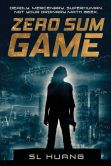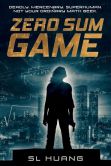Thank you to everyone for the supportive comments and response to this first week of guest posts. I’m especially grateful to the writers for sharing such powerful, personal, and important stories. My plan is to take a week off, then come back with the next round of posts, just to break things up a little.
S. L. Huang addresses a common problem of representation: the idea that straying from the mainstream by more than one axis is too much, too implausible…especially for a protagonist. You can’t be too “different,” because you’ll knock readers out of the story.
Thank you, S. L. Huang, for dismantling that argument so well.
I’m a tangled intersection of underrepresented (female, nonwhite, queer, among others). Even before I had the vocabulary to express it, even before I had the self-awareness to acknowledge it, I remember always looking for people “like me” in media.
That’s not too surprising, is it?
It’s that same twinge of relating one feels when, say, seeing a nerd character who gets to be awesome in a story. I was always looking for those. But I also related to people who matched my identity in other ways—women, Asians, children of immigrants, people who struggled with their own inherited culture. And the older I got, and the more I gravitated toward science fiction and fantasy, the more it happened that the characters I related most to were always the side characters. The support. The ones who never got enough time for their own stories … or whose stories flat-out weren’t told.
I used to think this was just a product of my own preferences being off-beat. But over time I began to realize that the more dimensions of my identity a character matched, the further she was relegated from being a main character. From being important, a hero who would take the helm and drive the story into its own world’s legend.
It started to feel wrong, a piece of reality that kept wobbling like a busted chair leg.
#
I sometimes call intersectionality “the problem of Star Trek captains.” We’ve had five series-leading captains: Kirk (white, male, American), Picard (white, male, European), Sisko (black, male, American), Janeway (white, female, American), and Archer (white, male, American). Not a single one differs in more than a single category from white, male, American.
When I was a teenager, I wrote a piece of Star Trek fanfiction with a captain who was female, half-human-Chinese-from-China, and half-Trill. And I wondered, as my teenaged self, why a series about a globalized Earth—one known for challenging barriers, no less—hadn’t had a similar one. The question made me itch under my skin in a way I couldn’t articulate at the time.
#
“Nobody is a sidekick in their own life,” the saying goes, and growing up I’d never felt like one. In high school, I was bright, precocious, super excited about learning absolutely anything, and excessively opinionated. I never doubted I deserved a seat at the table.
Until I grew up. Gradually, the juxtaposition of my accomplishments with my intersectionality have begun giving me frissons of unreality, as if I’m a monkey playing the piano. I imagine I’m in a book or a movie seeing the moment my character is established: The only girl in the math seminar … who is also nonwhite and queer and will save the world! The woman who outshoots all the men … who is also the Asian-American daughter of an immigrant and will be our Chosen Protagonist! And I’m jolted out of the scene, the bulwark of traditional culture whispering “unrealistic” in my ear.
And I’m not the only one who’s been the girl in the math seminar, or the woman who can outshoot all the men. Not even close. My best mathematician friend is a woman who’s smarter than I am, and the last time I taught shooting the most advanced marksman was a markswoman who’d moved to the U.S. from Japan. There are lots of us, and we all kick more than enough ass to lead our own stories. The lack of fictional counterparts in SFFdom … it’s frustrating, and it sometimes makes me feel desperately lonely.
And angry.
And lonely.
Over and over, I’m constantly reminded that the mere fact of my existence is too brash and unusual and radical to be believable as a hero. In SFF worlds, where it seems every lead character is Extraordinary and Chosen and Destined … simply being born on more than one real-life minority axis is a bridge too far.
#
“I’ll be your ethnic sidekick,” I said to my white friend, when she and I were planning to put together a webseries. I said it with a laugh and an eyeroll, in the way one does when one wants to mock something but is still too hesitant to challenge it. Serious-not-serious, funny-not-funny.
“Nah, nobody’s a sidekick,” my friend said. “We’re both too awesome.”
I will always love her for that.
#
 When I started the brainstorming process for what would eventually become my debut novel, I initially assumed I’d write my mathematically-superpowered lead character as a man. Probably a white man. Because … well, because. Something-something-mumble-blah about me being a nonwhite woman, and if I wrote my first lead as a nonwhite woman, no matter how different she was from me, wouldn’t that feel too contrived?
When I started the brainstorming process for what would eventually become my debut novel, I initially assumed I’d write my mathematically-superpowered lead character as a man. Probably a white man. Because … well, because. Something-something-mumble-blah about me being a nonwhite woman, and if I wrote my first lead as a nonwhite woman, no matter how different she was from me, wouldn’t that feel too contrived?
Because people from more than one underrepresented demographic are contrived.
Choosing to make my protagonist not only a woman, but a woman of color, felt … daring. Dangerous. Like people would find fault in her just for that. Not for any failures in writing or character, but for daring to exist, as a nonwhite woman leading her own story.
For existing.
I’m sitting here reading the history of my own thoughts and starting to cry. Because how many times have I looked at the television, or books, or movies, and wanted to scream, “I exist!”
I am the protagonist in my own life, in my own story. I am not anybody’s sidekick.
Neither are my characters. Neither are they.
I have now, thankfully, gotten over the knee-jerk reaction that every axis I assign to a character off the straight white able-bodied American male (etc) is somehow an additional layer of disbelief I’m asking my audience to suspend. That I must justify these choices. If I ever feel that urge, I remind myself I am a perfectly realistic person, someone whose birth needed no special reason.
And I do not need anyone’s permission to be a hero.
So I’m going to continue writing my main characters as nonwhite and female and queer and disabled and nonbinary and non-neurotypical and non-Western as I want, and cross these demographics with each other as much as I want, and make my characters drive their own stories just as much as I drive mine. Because we exist.
We exist.
SL “Lisa” Huang uses her MIT degree to write eccentric mathematical superhero fiction, starting with her debut novel, Zero Sum Game. Her short stories have sold to The Book Smugglers and Strange Horizons. In real life, you can usually find her hanging upside down from the ceiling or stabbing people with swords, and online she’s unhealthily opinionated at www.slhuang.com or on Twitter.

 I started with Beth Bernobich’s novel The Time Roads [Amazon | B&N | IndieBound], a collection of four novellas (or novelettes?) telling the story of an alternate Ireland at the start of the twentieth century. Part one, “The Golden Octopus,” introduces us to Queen Áine, the young ruler of the empire of Éire, and the scientist Dr. Breandan Ó Cuilinn, a pioneer in the science of time fractures. As a result of said time fractures, each novella reflects a slightly changed reality, with characters struggling to reconcile conflicting memories and events.
I started with Beth Bernobich’s novel The Time Roads [Amazon | B&N | IndieBound], a collection of four novellas (or novelettes?) telling the story of an alternate Ireland at the start of the twentieth century. Part one, “The Golden Octopus,” introduces us to Queen Áine, the young ruler of the empire of Éire, and the scientist Dr. Breandan Ó Cuilinn, a pioneer in the science of time fractures. As a result of said time fractures, each novella reflects a slightly changed reality, with characters struggling to reconcile conflicting memories and events. Next up was S.L. Huang’s Half Life, [Amazon | B&N], the sequel to Zero Sum Game, which I enjoyed and reviewed a while back. Mathematical genius and morally grey action hero Cas Russell is back, and this time she’s trying to track down a man’s missing daughter (who may or may not exist), fight off the mob, and track down some plutonium in her free time.
Next up was S.L. Huang’s Half Life, [Amazon | B&N], the sequel to Zero Sum Game, which I enjoyed and reviewed a while back. Mathematical genius and morally grey action hero Cas Russell is back, and this time she’s trying to track down a man’s missing daughter (who may or may not exist), fight off the mob, and track down some plutonium in her free time.





 When I started the brainstorming process for what would eventually become my debut novel, I initially assumed I’d write my mathematically-superpowered lead character as a man. Probably a white man. Because … well, because. Something-something-mumble-blah about me being a nonwhite woman, and if I wrote my first lead as a nonwhite woman, no matter how different she was from me, wouldn’t that feel too contrived?
When I started the brainstorming process for what would eventually become my debut novel, I initially assumed I’d write my mathematically-superpowered lead character as a man. Probably a white man. Because … well, because. Something-something-mumble-blah about me being a nonwhite woman, and if I wrote my first lead as a nonwhite woman, no matter how different she was from me, wouldn’t that feel too contrived?
 I very rarely read books electronically. I know, I know … but I don’t own an e-reader, and I spend way too much time staring at screens already. But I was stuck on the plane Sunday evening with nothing to read, so I pulled up my copy of Zero Sum Game
I very rarely read books electronically. I know, I know … but I don’t own an e-reader, and I spend way too much time staring at screens already. But I was stuck on the plane Sunday evening with nothing to read, so I pulled up my copy of Zero Sum Game